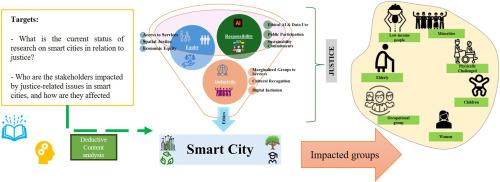对公正、公平、负责任和包容的智慧城市研究的系统回顾
IF 12.5
1区 社会学
Q1 SOCIAL ISSUES
引用次数: 0
摘要
发展智慧城市离不开数字技术和基础设施。然而,弱势群体往往无法公平地获得这些资源。在此背景下,将正义融入智慧城市发展是建设公正、公平城市的重要基础。为了探讨这个问题,我们检查了3067篇文章,并综合了67项关于智慧城市司法的研究结果。使用演绎内容分析,我们将正义问题分为两组:类型和维度。在各种类型的司法中,基础设施司法是最常被讨论的,出现在23项研究中,突出了边缘化社区在获得基本城市基础设施方面的巨大差距。从公正的维度来看,程序公正最为突出。在27项研究中讨论,它强调了包容性决策的重要性以及有限的公众意识和象征性参与所带来的挑战。研究结果表明,在智慧城市发展中,边缘化社区,特别是低收入群体、妇女和残疾人,首当其冲地受到排斥、不平等和边缘化的影响。这些社区特别容易受到中产阶级化、流离失所和经济机会减少的影响,进一步加剧了现有的不平等。通过将正义定位为智慧城市发展的核心要素,本研究呼吁从业者从根本上转变思维方式,倡导促进公正、公平、负责任和包容的智慧城市生态系统的政策和治理方法。本文章由计算机程序翻译,如有差异,请以英文原文为准。

A systematic review of research on just, equitable, responsible, and inclusive smart cities
Digital technologies and infrastructure are essential to the development of smart cities. Yet, vulnerable populations often lack equitable access to such resources. In this context, integrating justice into smart city development serves as a crucial foundation for developing just and equitable cities. To explore this issue, we examined 3067 articles and synthesized findings from 67 studies on justice in smart cities. Using deductive content analysis, we categorize justice issues into two distinct groups: types and dimensions. Among the various types of justice, infrastructural justice emerges as the most frequently discussed, appearing in 23 studies and highlighting significant disparities in access to basic urban infrastructure for marginalized communities. In terms of justice dimensions, procedural justice is the most prominent. Discussed in 27 studies, it emphasizes the importance of inclusive decision-making and the challenges posed by limited public awareness and tokenistic participation. The findings reveal that marginalized communities, particularly low-income groups, women, and individuals with disabilities, bear the brunt of exclusion, inequity, and marginalization in smart city developments. These communities are particularly vulnerable to gentrification, displacement, and reduced economic opportunities, further deepening existing inequalities. By positioning justice as a central element in smart city development, this study calls for a fundamental shift in the mindset of practitioners, advocating for policies and governance approaches that promote a just, equitable, responsible, and inclusive smart city ecosystem.
求助全文
通过发布文献求助,成功后即可免费获取论文全文。
去求助
来源期刊

Technology in Society
Multiple-
CiteScore
17.90
自引率
14.10%
发文量
316
审稿时长
60 days
期刊介绍:
Technology in Society is a global journal dedicated to fostering discourse at the crossroads of technological change and the social, economic, business, and philosophical transformation of our world. The journal aims to provide scholarly contributions that empower decision-makers to thoughtfully and intentionally navigate the decisions shaping this dynamic landscape. A common thread across these fields is the role of technology in society, influencing economic, political, and cultural dynamics. Scholarly work in Technology in Society delves into the social forces shaping technological decisions and the societal choices regarding technology use. This encompasses scholarly and theoretical approaches (history and philosophy of science and technology, technology forecasting, economic growth, and policy, ethics), applied approaches (business innovation, technology management, legal and engineering), and developmental perspectives (technology transfer, technology assessment, and economic development). Detailed information about the journal's aims and scope on specific topics can be found in Technology in Society Briefings, accessible via our Special Issues and Article Collections.
 求助内容:
求助内容: 应助结果提醒方式:
应助结果提醒方式:


